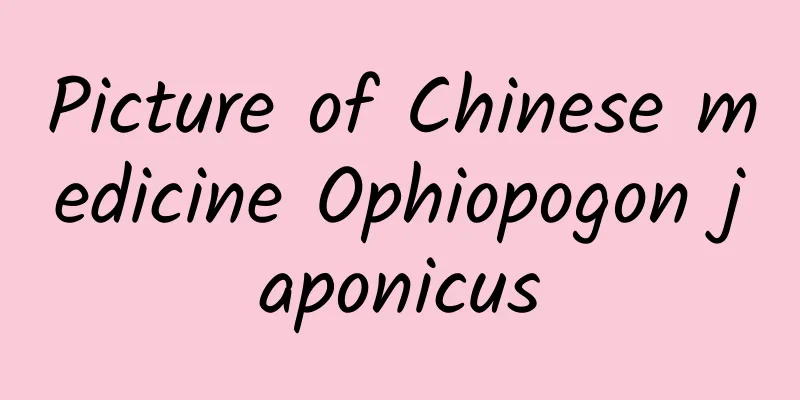Picture of Chinese medicine Ophiopogon japonicus

|
Ophiopogon japonicus is a common Chinese medicinal material in clinical medicine that nourishes yin, blood and yin. It has sweet and slightly bitter effects, and has a cold effect. It belongs to the heart, lung, liver and gallbladder meridians. It has the effects of nourishing yin and moistening the lungs, benefiting the stomach, promoting fluid and quenching thirst, purifying the heart and eliminating troubles, and promoting digestion. In clinical medicine, Ophiopogon japonicus is mainly used to treat symptoms such as dry cough with little sputum, dry throat, etc. caused by lung yin deficiency; it can also be used to treat symptoms such as vomiting, belching, and stomach noise caused by stomach yin deficiency; it can also be used to treat symptoms such as palpitations and insomnia caused by heart yin deficiency. Clinical medical application: In clinical medicine, Ophiopogon japonicus is often used to treat the following symptoms: 1. Ophiopogon japonicus can be used to treat symptoms of lung yin deficiency. When treating patients with dry cough with sticky phlegm, dry throat and dry nose caused by kidney yin deficiency and irritability, it is often used in combination with mulberry leaves, donkey-hide gelatin cakes and other medicines, such as Qingzao Jiufei Decoction; when treating patients with fatigue cough and hemoptysis caused by lung and kidney yin deficiency, it is often used in combination with asparagus, such as Erdong Paste. 2. Ophiopogon japonicus can also be used to treat symptoms of stomach yin deficiency. When treating patients with dry mouth caused by heat damaging liver yin, it can be used in combination with Adenophora scabra, such as Yiwei Decoction; when treating patients with heat damaging body fluid and dry intestines and constipation, it can be used together with Adenophora scabra and Rehmannia glutinosa, such as Zengye Decoction. 3. Ophiopogon japonicus can also be used to treat symptoms such as palpitations and insomnia caused by heart yin deficiency and febrile diseases. When treating patients with palpitations and insomnia caused by kidney yin deficiency and heat, it can be used together with raw rehmannia, spinach seed and other medicines, such as Tianwang Buxin Dan; when treating patients with evil disturbing the heart, fear of cold and irritability, it can be used together with scutellaria baicalensis, bamboo leaf heart, raw rehmannia and other medicines, such as Qingying Decoction. Contemporary use: Modern pharmaceutical research has confirmed that Ophiopogon japonicus has anti-arrhythmia, anti-shock, anti-tumor, lipid-lowering, anti-infection, sedative, hypnotic, improves blood thixotropy, and anti-coagulation effects. Modern use of Ophiopogon japonicus can treat viral myocarditis, heart failure, chronic heart failure, chronic atrophic gastritis, chronic pharyngitis and other diseases. |
<<: The efficacy and function of Chinese medicine Pi Pi
>>: Standard formula of Chinese medicine Sijunzi Decoction
Recommend
How to make breast enhancement wine and eggs, you can eat these to enhance your breasts
Fermented rice has a good breast enhancement effe...
Alcoholic depression
Alcoholic depression is actually a kind of depres...
Can I use air conditioning when I have a cold?
Wind-cold colds are caused by catching cold. When...
What should I do if I vomit after eating during pregnancy?
Morning sickness is a symptom that most women wil...
The efficacy and function of wild cauliflower
Wild flowers are edible, but people rarely pick t...
Is a small amount of pleural effusion serious?
In the middle of the visceral and parietal pleura...
What is the best way to treat eye floaters?
Many people usually find that their vision is ver...
What medicine to take for tension headache
If you are under too much stress or have severe a...
What kind of injection is usually used for gout injection
Gout is a common disease. There are many ways to ...
How to treat urethral adhesion in female babies?
It is very normal for the body to have diseases i...
What are the symptoms if the fetus stops growing?
Fetal growth retardation brings tremendous psycho...
Is it good to eat wolfberry on an empty stomach?
Lycium barbarum has many benefits. People with po...
How to deal with facial swelling?
I suddenly found that my face was swollen, which ...
Which type of rattan Panax notoginseng is poisonous?
Notoginseng is also known as Sichuan notoginseng,...
My knees make a sound every time I squat.
If the knees make a noise when you squat, osteoar...









